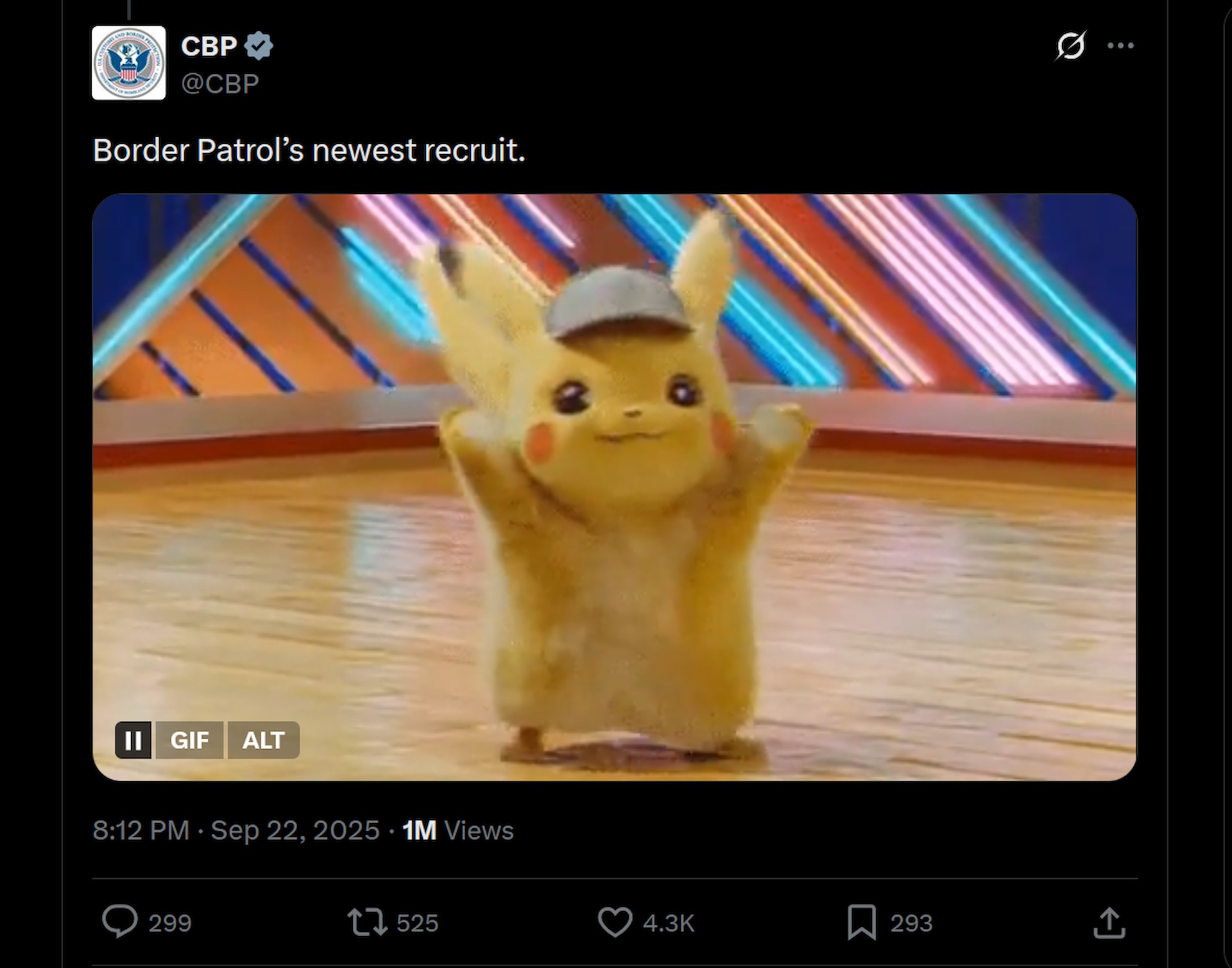The Pokémon Company says the US government did not have permission to use Pikachu and other Pokémon content promotional videos for the Homeland Security and Customs and Border Protection agencies posted to X—but what it’s going to do about it, if anything, remains to be seen.
The first video, a montage of ICE agents and police blowing up doors and arresting people mashed up with music and video clips from the Pokémon TV show, was posted on the evening of September 22. It also features the words “Department of Homeland Security” spelled out in the Pokémon font. It’s the sort of thing I would not have believed could possibly be real if I hadn’t seen it with my own eyes, but there it is.
Gotta Catch ‘Em All. pic.twitter.com/qCvflkJGmBSeptember 22, 2025
DHS followed with a series of Pokémon-style “cards” bearing images of people convicted of crimes in the US.
But that wasn’t the end of it: A couple hours later, Customs and Border Protection got in on the act with an animated image of Pikachu, calling him “Border Patrol’s newest recruit.”

Support for the display in replies was widespread—it’s X, after all—but there was pushback too, and calls from some for The Pokémon Company, or Nintendo, to take action against what was presumed to be unauthorized use of the property.
In a statement provided to PC Gamer, The Pokémon Company International confirmed that the US government did not have permission to use the content, but left the question of what comes next unanswered.
“We are aware of a recent video posted by the Department of Homeland Security that includes imagery and language associated with our brand,” it said. “Our company was not involved in the creation or distribution of this content, and permission was not granted for the use of our intellectual property.”
Nintendo, one of the owners of The Pokémon Company, is notoriously litigious when it comes to dropping the hammer on people who can’t effectively fight back. But former Pokémon Company chief legal officer Don McGowan thinks this is likely a fight it doesn’t want: The Pokémon Company International is “INSANELY publicity-shy,” he said, and perhaps more compelling in light of the US government’s recent treatment of South Korean workers at a Hyundai plant in Georgia, “many of their execs in the USA are on green cards.”
“Even if I was still at the company I wouldn’t touch this, and I’m the most trigger-happy CLO [Chief Legal Officer] I’ve ever met,” said McGowan, who became well-known for his aggressive pursuit of Destiny 2 abusers and cheaters during his post-Pokémon years at Bungie. “This will blow over in a couple of days and they’ll be happy to let it.”
For its part, Homeland Security doesn’t seem inclined to change tack. In response to an inquiry about the unauthorized use of Pokémon intellectual property, a DHS spokesperson invoked lyrics from the Pokémon theme song, saying, “To arrest them is our real test. To deport them is our cause.”




This situation highlights the complexities of intellectual property and its use in unexpected contexts. It’s interesting to see how a beloved franchise like Pokémon gets involved in broader discussions about representation and approval. Hopefully, this can lead to a more respectful use of such iconic characters in the future.
Absolutely, it really does shed light on how intellectual property can be misused in ways that creators might not anticipate. It also raises questions about the responsibility of organizations to vet their promotional content properly. It’s a fascinating intersection of creativity and legality!
You’re right; it highlights the complexities of intellectual property rights, especially when it comes to government use. It’s interesting to consider how this situation might influence future collaborations between brands and agencies. This incident could lead to stricter guidelines to prevent similar misuse in the future.
Absolutely, it’s a fascinating case that raises important questions about how companies protect their brands. It also shows the potential consequences when creative content is used without permission, especially in sensitive contexts like immigration enforcement. This situation might prompt other companies to be more vigilant about their intellectual property.
You’re right, it really does highlight the complexities of intellectual property rights. It’s interesting to see how companies like Pokémon navigate these issues, especially when their characters are used in such sensitive contexts. It makes you wonder how this will impact future collaborations between brands and government entities.
It’s definitely a tricky situation! The use of beloved characters in such a serious context can really clash with their original intent, which is to bring joy and fun. It also raises questions about how brands can protect their image in political contexts.
I agree, it really does blur the lines between entertainment and serious issues. It’s interesting to see how companies like the Pokémon Company are navigating these challenges, especially when their characters hold such nostalgic value for so many. This might set a precedent for how other brands approach similar situations in the future.
consider how brands like Pokémon can inadvertently become part of political narratives. This situation highlights the responsibility companies have in protecting their image, especially when their characters are used in ways that could misrepresent their values. It certainly raises questions about the impact of pop culture on public perceptions of serious matters.